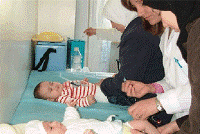 Syria's under-five population is being targeted for immunization against polio and measles as part of a national campaign6 December 2012 – A vaccination campaign is under way in the Syrian Arab Republic to immunize children under 5 against polio and measles.
Syria's under-five population is being targeted for immunization against polio and measles as part of a national campaign6 December 2012 – A vaccination campaign is under way in the Syrian Arab Republic to immunize children under 5 against polio and measles.
The campaign is being implemented by the Ministry of Health with support from the World Health Organization (WHO) and the United Nations Children’s Fund (UNICEF). In addition to the vaccines provided by the Ministry of Health, UNICEF procured 1.5 million doses of measles vaccine and WHO provided doses of infant paracetamol and multivitamin syrup. The Ministry of Health has increased its advocacy messages in the media to create awareness about the campaign throughout the country.
The total under-five population in the Syrian Arab Republic is almost 2.5 million children and the aim of the campaign is to reach every child, vaccinating all children below the age of five against polio and 2 million children against measles.
Due to escalations in the conflict, the national vaccination coverage for the first quarter of 2012 dropped from 95% to 80%, and it is expected to have dropped even further since then. Challenges in implementing the national immunization programme include difficulties in maintaining the cold chain (leading to destroyed vaccines) and reaching children in areas where access is limited due to blocked roads and security issues. Many vaccination and supply vehicles have been damaged or affected, resulting in critical shortages of transportation for the vaccines.
An estimated 4000 health workers and volunteers are participating in the campaign taking place across 13 of the country’s 14 governorates from 26 November to 10 December. The governorate of Deir El Zor was not included in the campaign as the majority of its residents have relocated to other areas in the country.
Field staff working on the campaign have reported that some areas where children live are inaccessible due to the ongoing conflict. Othman Mohamed, field worker and supervisor of the Damascus field teams, said that despite restrictions in accessibility, the teams have so far managed to reach all children targeted to date. Eight mobile teams are responsible for vaccinations in Damascus, including one team dedicated to reaching internally displaced persons living in shelters. Mohamed reports that an average of 12 000 children are being vaccinated daily by the mobile teams, as well as in health centres and preschools in the city.
The Ministry of Health has requested assistance from WHO in delivering vaccines to heavily affected areas. WHO has distributed 650 000 vaccine doses to areas in Aleppo, Homs and Rural Damascus where the Ministry has restricted access.
Three days after the launch of the campaign, WHO visited two health centres and a medical point located in Adraa, Rural Damascus, an area hosting 200 000 internally displaced persons. WHO reported that despite health staff being overburdened with an extremely high workload, the campaign at the facilities was well managed and vaccines were available and well stored. Almost 500 children were visiting the facilities every day, including many who had not been previously vaccinated.


